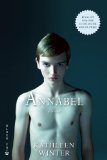Summary | Excerpt | Reading Guide | Reviews | Beyond the Book | Readalikes | Genres & Themes | Author Bio

A Novel
by Kathleen Winter
This was a kind of message younger people had lost,
but Treadway was attuned to every line and nuance. There
were words for each movement of a duck, and Treadway
had learned all of the words from his father. People five
years younger than he knew only half the words, but Treadway
knew them all, in his speech and in his body. This
was how he lived, by the nuances of wild birds over land
and water, and by the footprints and marks of branches in
snow on his trapline, and the part of him that understood
these languages detested time in houses. Clocks ticked,
and doilies sat on furniture, and stagnant air rushed into
his pores and suffocated him. It was not air at all, but
suffocating gauze crammed with dust motes, and it was
always too warm. If the women dreaming of life without
their husbands could know how he felt, they would not
imagine themselves single with such gaiety. Treadway did
not tell this to other men, laughing over broken buns of
hot bread and pots of coffee, but he dreamed it nonetheless.
He dreamed living his life over again, like the life
of his great-uncle Gaetan Joseph, who had not married
but who had owned a tiny hut one hundred miles along
the trapline, equipped with hard bread, flour, split peas,
tea, a table made out of a spruce stump with two hundred
rings, a seal-hide daybed, and a tin stove. Treadway
would have read and meditated and trapped his animals
and cured pelts and studied. Gaetan Joseph had studied
Plutarch and Aristotle and Pascal’s Pensées, and Treadway
had some of his old books in his own trapper’s hut, and
he had others besides that he read deep into the nights
when he was blessed with the solitude of his trapline. A
lot of trappers did this. They left home, they trapped, and
they meditated and studied. Treadway was one of them,
a man who studied not just words but pathways of wild
creatures, pulsations of the northern lights, trajectories of
the stars. But he did not know how to study women, or
understand the bonds of family life, or achieve any kind of
real happiness indoors. There were times he wished he had
never been seduced by the pretty nightgowns Jacinta wore,
made of such blowy, insubstantial ribbons and net that
they would not have enough strength to hold the smallest
ouananiche. The closest thing to these nightgowns in his
world outdoors was the fizz of light that hung in a veil
around the Pleiades. He had a Bible in his trapper’s library,
and he remembered his wife’s loveliness when he read the
lines Who can bind the sweet influence of the Pleiades, or
loose the bands of Orion? He read these lines on his hard
daybed when he had been away from her for months, and
they made him remember her loveliness. But did he ever
tell her this? He did not.
Home from the trapline, recovered from all loneliness,
Treadway loved his wife because he had promised
he would. But the centre of the wilderness called him,
and he loved that centre more than any promise. That
wild centre was a state of mind, but it had a geographical
point as well. The point was in an unnamed lake. Canadian
mapmakers had named the lake but the people who
inhabited the Labrador interior had given it a different
name, a name that remains a secret. From a whirlpool
in the centre of that lake, river water flows in two directions.
It flows southeast down to the Beaver River and
through Hamilton Inlet and past Croydon Harbour into
the North Atlantic, and another current flows northwest
from the centre, to Ungava Bay. The whirling centre was
the birthplace of seasons and smelt and caribou herds and
deep knowledge that a person could not touch in domesticity.
Treadway left this place at the end of the trapping
season and faithfully came back to his house, which he
had willingly built when he was twenty, but he considered
the house to belong to his wife, while the place where
waters changed direction belonged to him, and would
belong to any son he had.
Excerpted from Annabel by Kathleen Winter. Copyright © 2011 by Kathleen Winter. Excerpted by permission of Grove Press. All rights reserved. No part of this excerpt may be reproduced or reprinted without permission in writing from the publisher.
Your guide toexceptional books
BookBrowse seeks out and recommends the best in contemporary fiction and nonfiction—books that not only engage and entertain but also deepen our understanding of ourselves and the world around us.